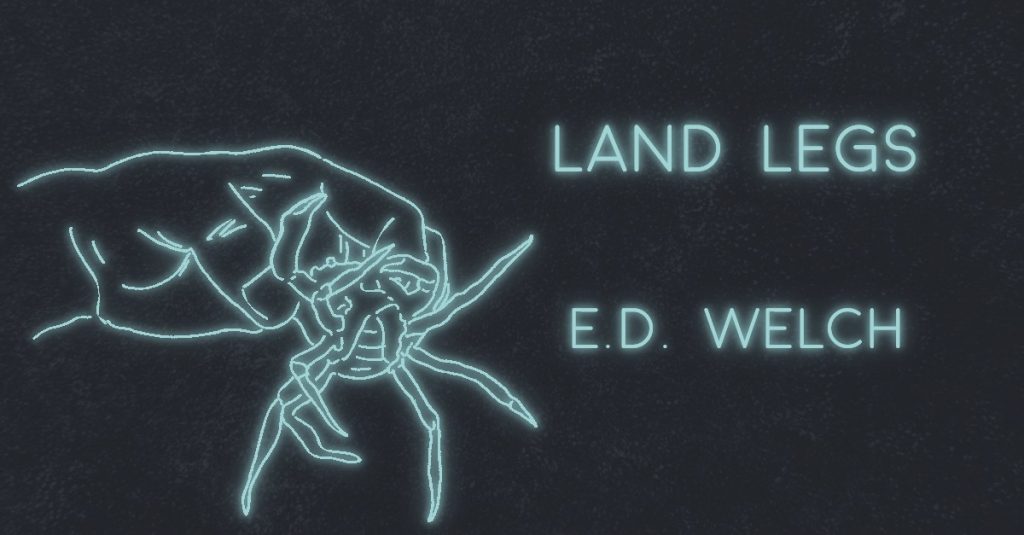
LAND LEGS by E.D. WELCH
Bittersweet day, this final one together. Frighteningly agenda-less, we wander through the aisles of small, art-filled stores, awkward in each other's company, unaccustomed to hanging out like this. “Do you want to go into this one?” I ask him at each store. “I don't care.” His only reply.I learn he likes art galleries—oil paintings, to be exact. I didn't know.Our aimlessness leads us eventually to the beach, where we find our land legs again. The beach: yes, we spent many, many hours at the beach together during his childhood, so this we know how to do. He shows me the tide pools, the crabs, the anemones. We watch the little mini-pools of ocean water caught in the rocks, populated with hermit crabs of every size and shape. Small ones, smaller yet, and ones so tiny you can hardly see them except for miniscule hair-like legs scrambling from under tiny spotted shells. “Pick one up,” I suggest. When he does, holding it pinched carefully between thumb and forefinger, I say, “Now promise it you won't put it into a bathtub.” His face breaks into a shy smile at the memory: When he was a preschooler on one of his first forays to the beach, he collected twelve hermit crabs, and I let him take them back to the house where we were staying. That evening I ran his bath water and stepped out while he climbed into the tub. When I returned a minute later, there he sat in the bathtub, a dozen dead hermit crabs floating around him. He thought he was doing them a favor by putting them back in the closest thing he had to the ocean. Now, he returns the crab to the tide pool and scrambles over the rocks—not in the carefree way like he used to—rather, heavier, wooden. But still. It's nice to see him silhouetted against the ocean, to talk to him with the beat of the waves pounding in stereo. We don't say much, and I feel bad about it at first. But what can I say? Stay clean gets old after a while, and we already discussed Hurricane Katrina ad nauseum. So I struggle to accept the silence as we walk. It's okay, I finally decide: part of supporting him is just being with him, just being there.We finally leave the beach and have dinner out with one of his counselors. “Don't stay in your head, man,” the counselor tells him, thumping his own forehead, “it's dangerous in there.” My kid gives a crooked grin of acknowledgement. I sit across the table, look at the two of them, and wish I could stay. While they eat, I push the food around on my plate, wondering how I’ll manage to board a plane in the morning, to leave my neediest child alone here. Sure, we have a great post-rehab structure in place: a solid sober-living home, counselors, scheduled outpatient work with the rehab place. His bases are covered, and I feel good about what we accomplished in such a short time this week. But still. Going home is hard to do. It's like leaving your preemie in the hospital. After dinner, he is antsy to get to the AA meeting. “Stop right here, Mom,” he says as we’re driving down the beach strip. “I’ve gotta save a seat at the meeting.”I slide my eyes right at him: he cares where he sits? This same boy who, just a month ago, refused to go to meetings? I pause in the side street, wondering why he’s really asking me to stop. “On Saturday nights it’s packed in there, standing room only.” He leaps from the car, taking those huge twenty-year-old bounds across the sidewalk. The car is empty for a moment, vacuum-like, then he’s back, energy in his wake. We drive to the rehab house to drop off his things: the alarm clock and towels we bought today, the only possessions he has here besides a few clothes. He takes the same kind of enthusiastic bounds into the house. I follow to drop off a check. The night-duty guy looks at me. “You taking him to an AA meeting? You bringing him back?” Before I can answer, he starts talking about my son’s last relapse. “He’s young. He was walking back from AA and—” he throws his hands up “—these girls asked him to come inside and party.” He says girls like he would say pigs. “It’s hard on these guys when they’re so young, you know?”Yeah, I know.My son reappears, freshly cologned. “Let’s go.”I drive him to the meeting, knowing I won’t see him again before I leave. How do you say goodbye on the side of the road in front of AA? How do you impart everything you want to say during that one stopset—that one pause in time? “Kiddo…” I begin. But it’s hopeless; there’s just too much to say. I make him wait while I climb out of the car to hug him.He holds me tight for a long moment. “Thanks, Mom.”And then he’s gone. I watch long enough to see him disappear into the seated crowd, the way I used to watch the kids walk into school. I pray his land legs will hold.
